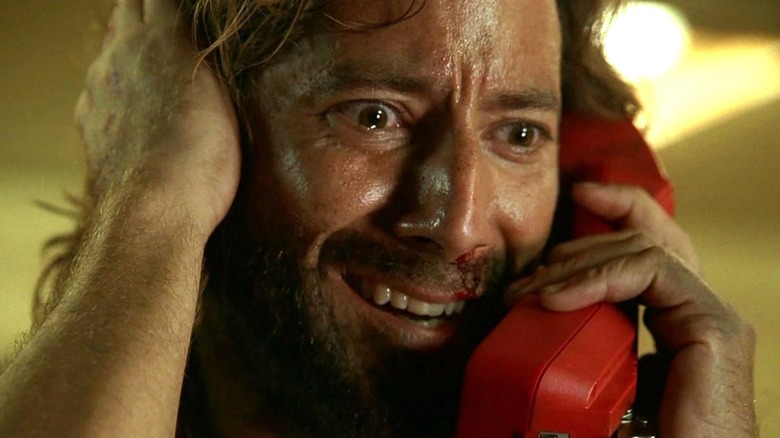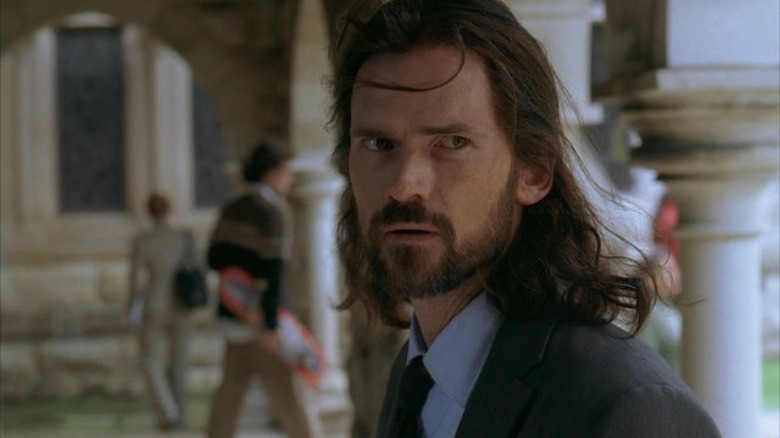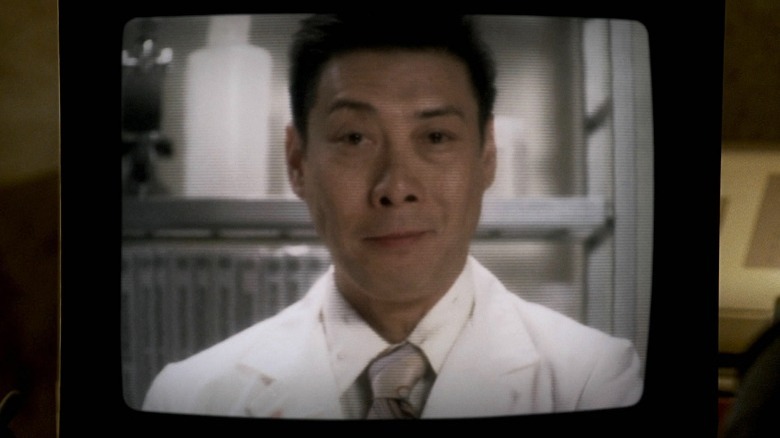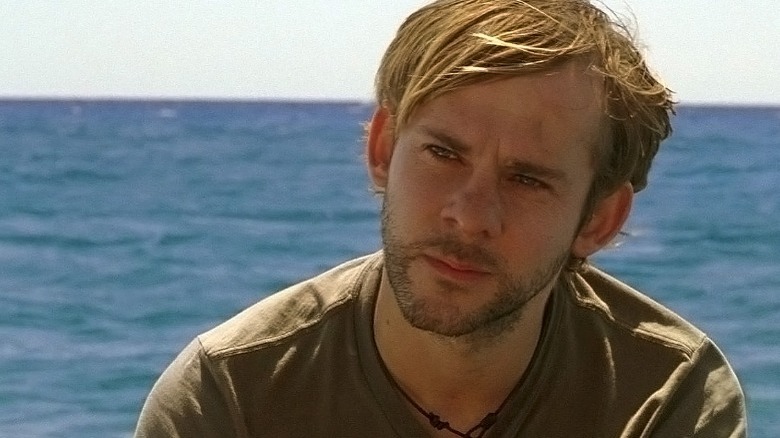How Does Time Travel Actually Work In Lost?
You know the joke: "Lost" isn't just the title of the show, it's how you feel after you watch it. Damon Lindelof and Carlton Cuse made TV history with "Lost," creating an epic and mysterious story the whole world seemed to be invested in. But fans and casual viewers are still bound to come away with a few questions, even after finishing all six seasons. "Lost" had fantasy and sci-fi elements from the start, with a mystical smoke monster that seemed to attack plane crash survivors and an island that simply wouldn't let them leave. However, the show really upped the ante (and the potential for confusion) when it introduced time travel.
Much of "Lost" can be explained by looking at its central, ideological push-and-pull. John Locke (Terry O'Quinn), who was healed by the Island, is a man of faith who believes destiny drives our actions. Jack Shephard (Matthew Fox) is a troubled doctor driven by logic who refuses to believe in the Island's power. In some ways, both men are right. Many of the miracles Locke witnesses are actually side effects of time travel, a scientifically explainable phenomenon. Still, the rules of time travel in "Lost" seem to dictate that anything that was meant to happen will happen, no matter how many complicating factors are thrown into the timeline. In that sense, fate does exist, with time travel partly responsible for the predetermination Locke believes in.
Let's Let Daniel Faraday Explain (Sort Of)
Look, I can't explain time travel. That's above my pay grade. But I do know someone who can. The Island's resident spaced-out physicist Daniel Faraday (Jeremy Davies) studied time travel long before parachuting onto its shores. Way back in 1996, Faraday was making lab rats' consciousnesses travel through time. Faraday got much of his science from the Kerr metric, a complicated real-life equation involving black holes that is pretty much the closest anyone has come to understanding theoretical time travel.
Faraday explains all of this much more simply to Desmond (Henry Ian Cusick), though, when the poor lad starts bouncing around in time in Season 4. "The Constant" is one of the show's most heartfelt episodes, but it also contains a most succinct description of time travel. At Faraday's urging, a temporally displaced Desmond finds the scientist at Oxford in 1996. Before Faraday even begins to demonstrate his time travel experiment, he tells Desmond something that underlines the "Lost" philosophy of time travel: "You can't change the future."
Faraday explains that the equations that can make time travel happen are random and chaotic, but he also says that "Every equation needs stability. Something known." This doesn't dig into the specifics of the Kerr metric, but it does explain the way time travel works in "Lost." The show clearly values hitting the right emotional beats over explaining the right equations. In this case, Desmond has to find a "constant" to keep his mind from falling into permanent confusion as his consciousness zooms back and forth in time. That constant is his girlfriend Penny (Sonya Walger), who he connects with on an emotional phone call later in the episode. If he can find her — no matter when he is — that will create stability in his timeline.
The Future Informs The Past, The Past Reinforces The Future
Daniel Faraday doesn't go too deep into the specifics of the principles of time travel, though he does mention electromagnetism a lot. The Dharma Initiative tried to study and harness that electromagnetism and also built a pendulum contraption that was meant to help figure out where the Island is moving in time and space.
One thing is for sure: It's clear that "Lost" subscribes to the idea that anything one does in the past is already firmly a part of the future. In Season 5, the Island's survivors aren't creating multiple timelines by wandering around in the 1970s. Instead, they're contributing to elements of the timeline we've already seen, creating a closed loop.
For example, when Jack finds out the Dharma Initiative plans to do experiments that he thinks will eventually cause Oceanic Flight 815 to crash, he tries to stop them by detonating a hydrogen bomb's thermonuclear core (seems like a cool and chill thing Jack would do). However, it turns out Jack's bomb helped cause The Incident, a vital moment in Dharma history that led to the creation of The Swan Station that Desmond eventually (although for us viewers, it was in an earlier episode) calls home. So any attempt to alter the past to fix the present will result in the same present the survivors are already in.
Whatever Happened, Happened
The best way to explain time travel in "Lost" is by explaining what it's not. This is not "Back to the Future." Hurley driving a Dharma van won't lead to him slowly disappearing from his family photo. It's also not like, say, the movie "Looper" in which getting hurt in the past leads future characters to suddenly develop new scars. In "Lost," time travel is cyclical and, at times, frustrating in its perfect ability to course-correct. This comes up again when Faraday attempts to warn six-year-old Charlotte that she will die if she ever returns to the Island. As an adult, Charlotte (Rebecca Mader) travels back to the Island to better understand where she came from, but her curiosity leads to her demise. Feeling the Island's effects more acutely than most, she dies in Faraday's arms.
"Lost's" attitude towards time travel is best summed up by one of the series' most oft-repeated phrases: "Whatever happened, happened." This phrase comes up several times throughout the show. Once again, Faraday puts it plainly: "If we try to do anything different, we will fail every time. Whatever happened, happened." There are no do-overs here. In the end, "Lost" took a more heartfelt, less neatly tied-up approach to the Island's nature than many fans expected, but the series has always used its more out-there elements as a means to an end.
The end? Human connection. On "Lost," you cannot stop death and tragedy, but you can use the chance you have to show love. We see it when ill-fated rock star Charlie (Dominic Monaghan) sacrifices himself and when Miles (Ken Leung) meets his father (François Chau).
When it comes right down to it, we should stop pulling our hair out trying to fill in the gaps in the way "Lost" explains time travel and start thinking about how it serves the show's core messages about mortality and togetherness. On this island, as in life, whatever happens, happens — even if it sometimes happens in the most confusing order imaginable — so you'd better make it count.



